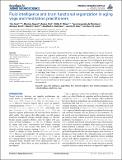| dc.contributor.author | Gard, Tim | |
| dc.contributor.author | Taquet, Maxime | |
| dc.contributor.author | Dixit, Rohan | |
| dc.contributor.author | Holzel, Britta K. | |
| dc.contributor.author | de Montjoye, Yves-Alexandre | |
| dc.contributor.author | Brach, Narayan | |
| dc.contributor.author | Salat, David H. | |
| dc.contributor.author | Dickerson, Bradford C. | |
| dc.contributor.author | Gray, Jeremy R. | |
| dc.contributor.author | Lazar, Sara W. | |
| dc.date.accessioned | 2014-06-19T18:09:53Z | |
| dc.date.available | 2014-06-19T18:09:53Z | |
| dc.date.issued | 2014-04 | |
| dc.identifier.issn | 1663-4365 | |
| dc.identifier.uri | http://hdl.handle.net/1721.1/88030 | |
| dc.description.abstract | Numerous studies have documented the normal age-related decline of neural structure, function, and cognitive performance. Preliminary evidence suggests that meditation may reduce decline in specific cognitive domains and in brain structure. Here we extended this research by investigating the relation between age and fluid intelligence and resting state brain functional network architecture using graph theory, in middle-aged yoga and meditation practitioners, and matched controls. Fluid intelligence declined slower in yoga practitioners and meditators combined than in controls. Resting state functional networks of yoga practitioners and meditators combined were more integrated and more resilient to damage than those of controls. Furthermore, mindfulness was positively correlated with fluid intelligence, resilience, and global network efficiency. These findings reveal the possibility to increase resilience and to slow the decline of fluid intelligence and brain functional architecture and suggest that mindfulness plays a mechanistic role in this preservation. | en_US |
| dc.description.sponsorship | National Institutes of Health (U.S.) (NIH award R21AT003673) | en_US |
| dc.description.sponsorship | United States. Dept. of Health and Human Services (Shared Instrumentation Grant Program, Grant 1S10RR023401) | en_US |
| dc.description.sponsorship | United States. Dept. of Health and Human Services (Shared Instrumentation Grant Program, Grant S10RR019307) | en_US |
| dc.description.sponsorship | United States. Dept. of Health and Human Services (Shared Instrumentation Grant Program, Grant 1S10RR023043) | en_US |
| dc.description.sponsorship | Kripalu Institute for Extraordinary Living | en_US |
| dc.language.iso | en_US | |
| dc.publisher | Frontiers Research Foundation | en_US |
| dc.relation.isversionof | http://dx.doi.org/10.3389/fnagi.2014.00076 | en_US |
| dc.rights | Article is made available in accordance with the publisher's policy and may be subject to US copyright law. Please refer to the publisher's site for terms of use. | en_US |
| dc.source | Frontiers Research Foundation | en_US |
| dc.title | Fluid intelligence and brain functional organization in aging yoga and meditation practitioners | en_US |
| dc.type | Article | en_US |
| dc.identifier.citation | Gard, Tim, Maxime Taquet, Rohan Dixit, Britta K. Hölzel, Yves-Alexandre de Montjoye, Narayan Brach, David H. Salat, Bradford C. Dickerson, Jeremy R. Gray, and Sara W. Lazar. “Fluid Intelligence and Brain Functional Organization in Aging Yoga and Meditation Practitioners.” Front. Aging Neurosci. 6 (April 22, 2014). | en_US |
| dc.contributor.department | Program in Media Arts and Sciences (Massachusetts Institute of Technology) | en_US |
| dc.contributor.mitauthor | de Montjoye, Yves-Alexandre | en_US |
| dc.relation.journal | Frontiers in Aging Neuroscience | en_US |
| dc.eprint.version | Final published version | en_US |
| dc.type.uri | http://purl.org/eprint/type/JournalArticle | en_US |
| eprint.status | http://purl.org/eprint/status/PeerReviewed | en_US |
| dspace.orderedauthors | Gard, Tim; Taquet, Maxime; Dixit, Rohan; Hölzel, Britta K.; de Montjoye, Yves-Alexandre; Brach, Narayan; Salat, David H.; Dickerson, Bradford C.; Gray, Jeremy R.; Lazar, Sara W. | en_US |
| dc.identifier.orcid | https://orcid.org/0000-0001-9086-589X | |
| mit.license | PUBLISHER_POLICY | en_US |
| mit.metadata.status | Complete | |
